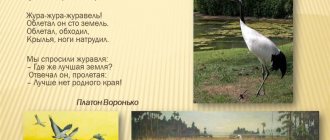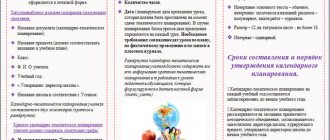Calendar and thematic planning in the senior group the month of May
PLANNING EDUCATIONAL WORK FOR APRIL 2021
1 week (from 04/03/17 to 04/07/17) Topic: “Victory Day”
Target:
Carry out patriotic education. Foster love for the Motherland. Formation of ideas about the Great Patriotic War, war heroes. Form ideas about the holiday dedicated to Victory Day.
Final event: festive concert “This Victory Day”,
Responsible
: educators, music supervisor.
Week 2 (from 04/10/17 to 04/14/17) Topic: “Insects”
Target
: introduce children to the diverse world of insects; develop attention, memory, imagination; cultivate interest in the diversity of the surrounding world, the desire to preserve its diversity
Week 3 (from 04/17/17 to 04/21/17) Topic: “Flowers”
Target:
To consolidate children's knowledge about seasonal changes in nature that occur in the spring, to develop logical thinking and creative storytelling skills.
Week 4 (04/24/17 to 04/28/17) Topic: “Summer will come to us soon”
Target:
To form in children generalized ideas about summer as a season. Introduce summer sports.
Final event: festive event “Hello, Summer”!
Responsible for the final event: teachers, music director.
Group: senior “A” Cherry
| Day of the week | Mode | Integration of educational areas | Joint activities of adults and children, taking into account the integration of educational areas | Creating conditions for joint activities | Working with parents | ||
| Group, subgroup | Individual | Educational | |||||
| 1 | 2 | 3 | 4 | 5 | 6 | 7 | 8 |
| MONDAY (May 2017) | Morning | Cognitive development Social and communicative development Artistic and aesthetic Physical development Speech development | Morning exercises. What kind of military are there, literary composition “Turning Through the Pages of History.” | Cognitive and research activities: The Great Patriotic War. War heroes: children and adults. | Situational conversation “What is heroism?” Continue to familiarize yourself with the rules of duty in the group. | Independent activity of children in activity centers. drawing “War through the eyes of children.” | Talk with parents about the well-being of their children. Individual conversations and consultations at the request of parents |
| GCD | Cognitive development | COGNITION :1 “What are insects?” Volchkova-Ecology p.112 -05.15.17 2. “The Earth is our common home” Volchkova-Ecology p.121 – 05.22.17 3. “What is summer?” (see internet) – 05.29.17 | |||||
| Artistic and aesthetic | Music (as planned by the music director) | ||||||
| Walk | Cognitive development | Weather observation Objectives: to form the idea that changes in nature in spring are associated with the rotation of the Earth around the Sun Outdoor games "Get to the ball." S/r game "Gardeners" | Individual work Development of movements. Goal: to train in running along a narrow path, between lines with acceleration and deceleration of the pace with Nastya, Anya A., Kostya. | Situational conversation “You need to know how to dress yourself.” Fix the sequence of dressing and undressing. | Independent activity during a walk. Games with external material. Labor activity Cleaning up trash on site. Goal: to cultivate a desire to work. | ||
Work organization plan for May for the senior group
Koryeva Ksenia
Work organization plan for May for the senior group
Month of the Week Work on the site Program content Work in a corner of nature Program content Household work Program content
May 1 Helping adults dig up trees and shrubs . Continue to teach children to help adults. Foster hard work and mutual understanding. Nature calendar. Final work with the nature calendar: comparison of weather based on children’s drawings: “Seasons”
Strengthen children's knowledge of how to work with a calendar.
Help ml. The teacher will cut and fold the napkins. Strengthen children's skills in using scissors and folding napkins. Foster a desire for joint activities .
2 Teamwork . Strengthen children's skills in collective work . Foster mutual assistance and develop labor skills . Replanting indoor plants. Labor education . Zhukova p. 50 No. 22 Expand children's understanding of labor actions .
Develop attention. Improve plant care skills. To consolidate knowledge about the conditions necessary for plant life. To cultivate a caring attitude toward plants, curiosity, and the desire to care for them. To consolidate children's knowledge about replanting indoor plants. Cultivate diligence , industriousness , bring the work started to the end. Cleaning the construction area. Have the building material wiped with a damp cloth. Strengthen children's skills on how to use a rag and sponge.
3 Near the flower bed. Page 73 Clarify children’s ideas about the role of flowers in people’s lives. Improve work skills : the ability to independently use equipment, work rationally at a uniform pace. Create a work . Teach children to respect nature. Labor order . Strengthen the skills of those on duty in caring for living objects in a corner of nature. Cultivate care and concern for them. Shoe care. Strengthen children's shoe care skills. Keep shoes clean.
4 Collective work on the site . Develop work skills , dexterity, dexterity, willpower. To form a desire to keep the site in order, to cultivate a sense of camaraderie and mutual assistance. Activities in a corner of nature . The attendants examine the condition of the soil and leaves and determine which plants need watering, loosening, caring for leaves, fertilizing, and transplanting into a larger pot. We love order in everything. R. A. Zhukova. p. 76 Improve work skills in the process of work. Learn to maintain order in closets with toys and equipment; work together, agree on the distribution of responsibilities, notice the disorder, offer to eliminate it, and, if necessary, help each other. Develop the ability to communicate with adults and develop sociability.
Thematic lesson for Victory Day - May 9 in kindergarten in the senior group
Scenario for a thematic lesson dedicated to May 9 in the senior group “War... We will never forget it!”
Description of the material : I offer you a scenario for a thematic lesson dedicated to the holiday of May 9, for older children (5-6 years old) on the topic: “War... We will never forget it!” This material provides for the development of patriotic education in preschool age. The material is interesting, easily understood by children, and will be useful for teachers of older preschool age. Summary of a thematic lesson in the senior group on the topic “War... We will never forget it!” Integration of areas: educational areas “Cognitive development”, “Speech development”, “Socio-communicative development”. Goal: To foster a sense of pride in one’s homeland. Program objectives: 1. Educational: To introduce children to the tradition of celebrating Victory Day; Expand children's understanding of the Russian army and war veterans. Promote the harmonization of parent-child relationships. 2. Developmental: Expand gender ideas, develop in boys the desire to be strong, courageous, and become defenders of the Motherland; Develop mental activity: thinking, imagination, memory; Develop children’s speech activity, encourage the desire to reason, express their opinions; Improve coordination of movements, develop dexterity, speed, ingenuity and accuracy in children. 3. Educational: To educate in the spirit of patriotism, love for the Motherland; To instill in children respect for veterans, current defenders, and future defenders of the Motherland. Didactic material: Demonstration: Multimedia projector, screen, presentation: “Presentation about the war”; Peni track:
“Holy War”, music.
A. Alexandrova; track of the song
“Dark Night”, music by N. Bogoslovsky, lyrics by V. Agatov;
track of the song
“Victory Day!”
composer David Tukhmanov and poet Vladimir Kharitonov; Lighted candle; gallery with photos of obelisks and monuments in the cities of heroes of Russia. Handout: lilac branches and flowers; balloons according to the number of children; Preliminary work: Conversation with children on the topic: “At what cost did we get the Victory?” The teacher's story about the difficult but honorable duty of the defenders of the Motherland, to protect its peace and security; Conversation with children on the topic: “How our great-grandfathers, grandfathers and fathers bravely fought and defended our country from enemies during the war years” Reading Russian folk epic: “Ilya Muromets and the Nightingale the Robber” Reading: E. Uspensky “A Terrible Story”, “Memory” "; S. Romanovsky “On tanks”, S. Alekseev “First night ram”, E. Vorobyov “Broken wire”. Memorization: E. Blaginina “The Overcoat” Making riddles about the army and branches of the military. Examination of a reproduction of the painting “Bogatyrs” by V. Vasnetsov. Listening: “Cavalry” music. D. Kabalevsky. Drawing on the theme: “Border guard at the border”, “At the obelisk!” Modeling on the theme: “Border guard with a dog” Application on the theme: “Military equipment” Outdoor games: “Running”, “Shootouts”, “Who is more dexterous?”, “Whose team will win?” Co-role-playing game: “Army”, “Package for commander”, “Victory Day!” Board games: “Travel on the map”, “Complete the task”, “Clear the field” Vocabulary work: veterans, obelisk. Methods and techniques used: Teacher's story, explanation, questions to children, answer-reasoning, ICT, gaming methods and techniques, surprise moment meeting with a veteran. Characters: teacher, children.
Progress of the thematic lesson
“War... We will never forget it!” War is too big a disaster.” Presenter: On May 9, all our people celebrate a great holiday - Victory Day. Many years have passed since German troops attacked Russian soil. Our people, young and old, men and women, even children, began to defend our Motherland from the enemy. 1. The phonogram of the song
“Holy War” sounds, music.
A. Alexandrova. Get up, people! Hearing the cry of the Earth, the soldiers of the Motherland went to the front. The soldiers bravely went into battle for every city and for you and me! They wanted to take revenge quickly For the elderly, for the women, for the children! Presenter: “Get up, huge country.” This music, these words were familiar to every person during the war. This song was a call to battle, to fight the enemy. We remember with gratitude our warrior defenders who defended the world in a fierce battle. We owe it to all our defenders, today's veterans and those who are not with us, that we now live under a peaceful, clear sky. Eternal glory to them! MONTAGE: Victory Day is the holiday of our grandfathers. Their feat illuminates our path. Let's say to everyone: “Thank you for the Victory!” There are very few veterans now. Our grandfathers accomplished a feat - they recaptured their homeland from the Nazis! And no matter how many years pass, their feat lives in our hearts. Let's remember everyone who did not return from the battle, Let's remember them silently, of course standing. Let their eternal fire burn. And he says thank you on our behalf. Our grandfathers fought fearlessly, To free the land from the enemy, Therefore, a great Victory Day! And we will never forget their feat! Victory Day is a great day! So many years have already passed, This joy is not forgotten, Our souls are warm. We say “thank you” to grandfather, For the life we live. Today we celebrate Victory! And we sing songs together! The children take their seats. A presentation about the war comes on. Host: On cold autumn evenings, in moments of calm between battles, the soldiers rested, sitting by the fire, mending their clothes, cleaning their guns, remembering peaceful days, singing songs and writing letters to their relatives. A letter from the front from a son to his mother. 2. Read to the soundtrack of the song “Dark Night”
Hello, dear mother.
Your son is writing to you. I'm fine. Yesterday we repulsed the enemy's attack. A lot of our soldiers died. Every day we move further and further towards Stalingrad. The German holds defeat. When there is no battle going on, soldiers sit and dream about when they will return home to their beloved wife, mother and children. And never see these battles again. Many people are now dying of hunger. Because we are not receiving food due to heavy rains. All the roads are in ruins, the vehicles cannot get to our division and cannot even take out the wounded. Mom, how I miss home. When I fall asleep, I dream of our house, garden and you, mother, in white. I have that dream every time. I am finishing my letter. Goodbye. Your beloved son. Host: And the soldiers also remembered their wives, beloved girls, sisters, mothers. They remembered how good, cozy, warm it was with them at home. They knew that they were waiting for them from the war, they believed that they would return alive and with VICTORY! And this always made my soul warmer. Such letters were necessary for the soldier. It is no coincidence that the girl Katyusha from the song that everyone now knows, both adults and children, became a symbol of fidelity and hope. This song turned out to be dear to everyone. And during the days of the war, the soldiers nicknamed the formidable artillery weapon “Katyusha”, which the enemies were terrified of. 3. Children sing the song “Katyusha” Presenter: Many children went to the front straight from school. The war scattered young guys - some to become tankers, some to become anti-aircraft gunners, some to become telephone operators, some to become scouts. Presenter: Shells exploded with a roar, machine guns fired, tanks rushed into battle, crushing everything around. The earth was on fire. People gave their lives for their native country, We will never forget those who fell in valiant battle. Many soldiers did not return home from that war. We will never forget the heroes: no matter how many years pass, descendants will always cherish the memory of their fathers and grandfathers and thank them for defending the world in the name of our bright life! Let's remember all the fallen heroes and bow our heads before their feat! A minute of silence is announced! Presenter: (with a lit candle): Look, children, at the hot candle. Do you see how the flame trembles? There is a fire that evokes special feelings and special memories in people. This is the fire on the Tomb of the Unknown Soldier. Children go out to the gallery, where they look at the image of the eternal flame and monuments in the heroic cities. There are many such graves on our land. Soldiers who died during the war are buried in these graves. People will always remember that the fallen soldiers defended their Motherland, their relatives and friends, their children, grandchildren and great-grandchildren. In honor of the victory over fascism, the Eternal Flame burns so that people do not forget about the exploits of our heroes. To the Heroes of Victory - thank you!!! - two children say THANK YOU TO THE HEROES, THANK YOU TO THE SOLDIERS FOR GIVING PEACE, Then - in forty-five!!! You are blood and sweat. We got VICTORY. You were young, now you are already grandfathers. WE WILL NEVER FORGET THIS VICTORY!!! May the sun be PEACEFUL. Shines for all people!!! May there be happiness and joy. They live on the planet!!! After all, peace is very necessary - for both adults and children!!! Host: Thank you to our valiant soldiers for winning that cruel war. And so May 9th was proclaimed World Victory Day! 4. The phonogram of the song “Victory Day” plays. Presenter: And now we will go to the obelisk of memory in our village of Kanevskaya to lay flowers to all those who gave their lives for us, for our peaceful and bright future. And we will release these white balls into the sky as a symbol of peaceful life on earth.
We recommend watching:
Summary of a lesson in the senior group on the topic: Victory Day - May 9 Summary of a music lesson for May 9 - Victory Day in kindergarten in the senior group Summary of a thematic lesson for children of the senior group "Great Holiday - Victory Day" Lesson - a trip to the "Memorial Complex to the Heroes" WWII" with older children
Similar articles:
Scenarios for May 9 in kindergarten. Senior - preparatory group


